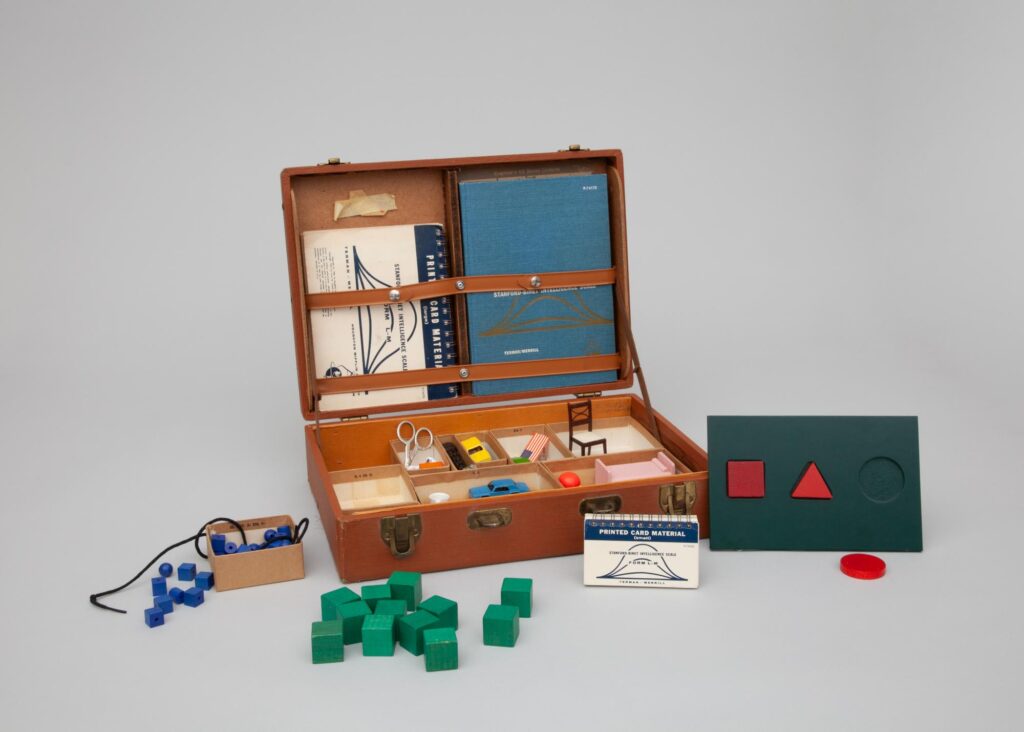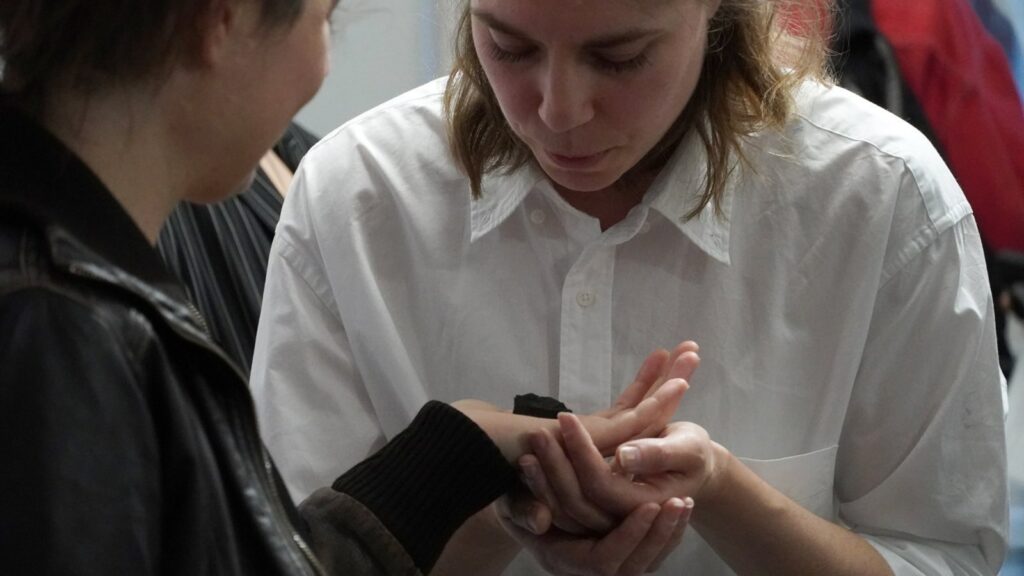Salon vom 06. Dezember 2024
»On the Subject of Tests: Performing with Objects«
Sasha Bergstrom-Katz (Berlin)
Bergstrom-Katz is an artist, researcher and writer living in Berlin. Currently, she is a visiting fellow at the University of Bielefeld in the History and Philosophy of Medicine having recently completed a visiting fellowship at the Max Planck Institute for the History of Science in a working group on the Practices of Validation in the Biomedical Sciences. She also co-runs the working group Performing Science and Medicine with Dr. Michele Luchetti and is co-editing a volume with Dr. Suzanne Hudson and Dr. Sarah Marks on art and psychotherapy for Oxford University Press. She has a PhD from Birkbeck, University of London in Psychosocial Studies and an MFA in Art from the University of California, Irvine.

Image: IAC30.8.21_Sasha Bergstrom-Katz: On the Subject of Tests: Rehearsing the Examination (Outtake), 2021. Video: 36:52 minutes.
On the Subject of Tests is a multi-part project which recasts two twentieth-century intelligence tests, the Wechsler and Stanford-Binet Intelligence Scales, in a series of roles. It re-envisions the intelligence test kit as, in turn, an auto-archive, a rhetorical vessel, and a performance in a box. The project’s subsection, entitled Performing with Objects, uses artistic methods to reframe the test kits and their contents as props, highlighting both the materiality of the kits themselves, which are composed of toys, games, puzzles and booklets, and how these objects play a part in the performance of testing.
Relationships are the artistic material of Kirstin Burckhardt’s research and practice. Her interdisciplinary performances, videos installations, and publications expose how relationships are a real-time choreography and experience via the body – especially in care or power politics. Critically drawing upon her background in psychotherapy and neuroscience, she uses embodied voice and resonant listening to articulate poetries of personal and collective sensitivities, conflicts, and the complexities of healing. Her collaborative practice does not only mean to work together, but to confront and share what it means to be in a relationship – as a radical act. She has published in Frontiers of Psychology and is a member of IMHAR (Institute for Medical Humanities and Artistic Research). Her works have received numerous grants, most recently from the Fonds for Performing Arts, and has exhibited internationally in solo and group shows at Kunsthalle Nürnberg, Deichtorhallen /Sammlung Falckenberg Hamburg, and Goethe Institute Los Angeles, among others.
Salon vom 27. Juni 2024
»Visual and Material Culture & Medical Humanities«
Fiona Johnstone (Durham University)
As guest in our salon, Fiona Johnstone, Assistant Professor in Visual and Material Medical Humanities at Durham University, gave us insights into the work of the Visual and Material Lab that she currently leads as part of the Discovery Research Platform for Medical Humanities at the University of Durham (2023-2030). The platform brings together humanities and social science researchers, people with lived experience and people working in different sectors to co-develop new and experimental approaches to tackling health challenges. The Lab takes up this strand and looks to new questions, innovative methods, and alternative perspectives on health that are generated when visual and material culture is taken as a starting point. Find beside a link to the manifesto that Fiona wrote for a Visual Medical Humanities!
IMHAR on Tour 19.–21. Juni 2024
»Art & the Critical Medical Humanities: Confabulations X Health & Care at the RCA«
Mit unserem Beitrag Lying in. Confabulations from the bedside waren wir, Angela Alves (Berlin/IMHAR), Monika Ankele (Berlin/IMHAR) und Céline Kaiser (Ottersberg/IMHAR), zur Vorstellung und Diskussion der geplanten Publikation Art & the Critical Medical Humanities (Bloomsbury Critical Interventions in the Medical and Health Humanities) am Royal College of Art Battersea, London, eingeladen.
Kolloquium vom 28. Mai 2024
»Medical Humanities & Climate Change«
Diskussionsrunde mit Tobias Dietrich (Universität Bremen/IMHAR), Prof. Dr. Céline Kaiser (Hochschule für Künste im Sozialen, Ottersberg
/IMHAR) und Prof. Dr. Sophie Witt (Universität Hamburg)
Welche Rolle spielen Phänomene des Klimawandels für die Medical Humanities? Im Rahmen eines Roundtables wollen wir, Prof. Dr. Sophie Witt, Literatur- und Theaterwissenschaftlerin vom Studiengang Liberal Arts der Universität Hamburg, Tobias Dietrich, Filmwissenschaftler an der Universität Bremen und Prof. Dr. Céline Kaiser von der Hochschule für Künste im Sozialen, Ottersberg, über diese und weitere Fragen ins Gespräch kommen. Wie können wir Phänomene planetarer Gesundheit adressieren? Wie verhält sich die Gesundheit einzelner zu gesellschaftlicher und planetarer Gesundheit? Welche Bedeutung haben audiovisuelle Medien und künstlerische Praktiken bei der Konstruktion unserer Vorstellungen von der uns umgebenden Natur und von der Wechselseitigkeit von Ökologie und (psychischer) Gesundheit? Und wie erforschen und vermitteln wir dieses neue Themenfeld innerhalb der Medical Humanities? Uns interessiert, welche Kompetenzen die Künste und – im weitesten Sinne – angewandte Kultur- und Geisteswissenschaften im Kontext von Klimawandel und Kulturwandel (weiter-)entwickeln können.
Salon vom 12. April 2024
»Living with Long Covid. Interviews and Photographs«
Monika Pietrzak-Franger (Universität Wien) und Peter Mayr (Wien)
In this talk, Monika Pietrzak-Franger, full professor for British cultural and literary studies at the University of Vienna, gave us an insight into her project “Living with LongCovid”. As a sub-strand of the interuniversity research cluster Post-Covid-19 Care, this project asks what it means to live with Long Covid every day. It explores not only how patients deal with their symptoms, but also their struggle for recognition, the lack of effective therapies,the lack of interest in their problems, the limits of scientific knowledge and the lack of (statefunded) social support. Based on interviews and photographic material produced with and for Long Covid patients in Austria, it shows the disease – its individual, family and social effects – from the perspective of those affected. It translates the experience of those affected into a detailed account of how Long Covid changes lives and thus offers an impressive testimony to their struggle. The photos, taken by Peter Mayr, are records of what the patients wished larger public to know about their struggles. Together with the texts based on the interviews, they counterbalance the mainstream media reports on Long Covid,which are often – and with few exceptions – one-sided, frequently use generic images and perpetuate stigmatizing narratives and iconographies of illness. We hope that our participatory, co-creative approach will contribute to the diversification and visualization of patients’ experiences in the media.
Salon vom 12. Januar 2024
Prof. Dr. Ylva Söderfeldt und Dr. Erika Sigvardsdotter, Leitung/Director und Koordinatorin/Coordinator, stellten ihr Center for Medical Humanities der Universität Uppsala (Schweden) sowie neue Formate der Zusammenarbeit im Zuge des Artists in Residence Programms vor, das im Jahr 2023 mit der Künstlerin Anna Odell startete

